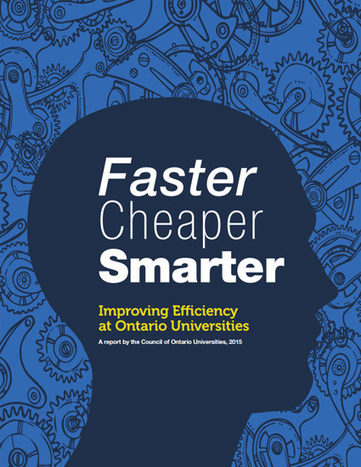 Your new post is loading...
 Your new post is loading...
"We need a cultural shift in how we provide comments on student work, say Naomi Winstone and Robert Nash"
Summary from Academica Top Ten - Friday, October 7, 2016:
"Students will not appreciate feedback until they learn how to use it, says THE contributor
“What students do with expert advice is at least as important as the advice itself,” write Naomi Winstone and Robert Nash for Times Higher Education. The authors allude to UK data showing that students are less satisfied with the feedback they receive from instructors than they are with any other aspect of PSE. Yet the authors argue that no amount of feedback would ever be enough to solve this issue, because the only way to address it is to train students on how to properly incorporate and learn from feedback, which requires resilience and flexibility. “To really achieve this goal properly, we need a cultural shift in higher education,” the authors conclude. “Moving away from the notion of feedback simply as something we give away to students and towards one that sees it as a two-way street, with shared responsibilities and expectations.”"
Via iPamba
"Image from poster for "Universities in a Dangerous World" conference"
"Universities that set up shop globally should work to uphold principles such as academic freedom, gender equity and freedom of speech -- but they sometimes compromise, scholars argue."
Summary from Academica Top Ten - Thursday, June 16, 2016
"How do universities ensure proper ethics in international partnerships? Universities will sometimes compromise on principles like academic freedom, gender equity, and freedom of speech when establishing campuses in other countries, writes Elizabeth Redden for Inside Higher Ed. The author highlights some of the takeaways from a recent conference on the subject, which brought experts together to discuss some of the ways that schools can structure their partnership agreements to better protect their institutions' values internationally. As one US higher ed leader notes, there is always the “challenge of bringing liberal education to societies and environments which are difficult, where it’s not familiar, where you’re not used to doing this type of education and where you might have creeping authoritarianism.”"
Via iPamba
This report showcases how Ontario universities are continuing to improve efficiency by finding new ways of doing business through innovative partnerships. Academica Top Ten - Friday, December 4, 2015 "ON universities becoming more efficient, survey says Ontario universities are improving their efficiency through a variety of partnerships, collaborations, and cost-saving measures, all while still improving services for students and staff, according to a new report by the Council of Ontario Universities. The report discusses a number of multi-institution projects that were conducted using the $45 M Productivity and Innovation Fund provided by the Ontario government. It highlights the way that various ON universities have improved their use of technology to make their campuses safer and to better manage information. Further, the report finds that these institutions have enhanced their facilities and operations to reduce waste and improve student experience while modernizing their administrative processes through collaboration, improved human resources, and space management."
Via iPamba
Summary from Academica Top Ten 26 August 2014 SMA highlights George Brown's support for lifelong learning, responsiveness to market needs
George Brown College’s responsiveness to emerging needs in the economy, its partnerships in the community, and its support for lifelong learners are identified in the strategic mandate agreement (SMA) between the college and the province as the institution’s primary areas of differentiation. The SMA points out several areas of institutional strength, including the college’s support for applied research through the Green Building Centre and the Food Innovation and Research Studio, its work with organizations such as the Toronto Construction Association and Cisco, and its flexible learning models and experiential and work-integrated learning options. The SMA also notes George Brown’s focus on access and success for underrepresented groups including Aboriginal students, first-generation students, immigrants, and persons with mental illness and/or addictions. George Brown is also recognized as a leader in college-to-college business articulations and for its global partnerships. The SMA names 5 areas of proposed program growth: hospitality management, art and design, construction, community health, and business management. George Brown SMA
Via iPamba
An increasing number of colleges and universities are offering MOOCs, but few have crunched the numbers to determine whether these online courses can succeed as a business proposition.
Via iPamba
|
"Faculty member Betsy Lucal now strongly urges any student who will listen to reconsider their plans to earn a Ph.D."
Summary from Academica Top Ten - Monday, September 26, 2016:
"“I think they should not do it,” says IHE contributor of pursuing a PhD “I strongly urge any student who will listen to reconsider their plans to go on to earn a PhD,” writes Betsy Lucal for Inside Higher Ed.
A professor at Indiana University South Bend, Lucal writes that universities’ increasing tendency to cut costs and follow the principles of “consumerism, individual empowerment and self-interest” has created a higher ed landscape in which she, a tenured professor, questions whether she will be able to make a living from academia for the remainder of her career.
Lucal outlines a number of other reasons to avoid earning a PhD and entering academia."
Via iPamba
"Once upon a time in America," says professor Sajay Samuel, "going to college did not mean graduating with debt." Today, higher education has become a consumer product — costs have skyrocketed, saddling students with a combined debt of over $1 trillion, while universities and loan companies make massive profits. Samuel proposes a radical solution: link tuition costs to a degree's expected earnings, so that students can make informed decisions about their future, restore their love of learning and contribute to the world in a meaningful way.
Via iPamba
Because the work of presidents has grown exponentially, taken on relentless speed and become increasingly distant from the classroom, many believe that presidents no longer have any place as professors. Although I had been an award-winning, tenured full professor for many years, and more recently as a dean and provost guided doctoral research and taught a graduate seminar, I had to persuade my faculty union to approve me to teach at my current university. And, once approved, even though my only experience teaching freshmen was well before our current class of students was born, I was limited to a 100-level freshman class (designed to teach critical thinking, analysis and effective communication). No problem -- I wanted to teach a first-year seminar because I suspected I would learn a great deal from doing it, and I did.
Via iPamba
A report contends that business schools shunning MOOCs may miss opportunities to tap more minorities and international students The following summary is from Academica Top Ten, 5 June 2014 MOOCs help business schools reach sought-after student demographics A new report in the Harvard Business Review says that rather than "cannibalizing" business school enrolment, MOOCs offer an opportunity to attract new student demographics. The study of over 875,000 students in 9 MOOCs offered by the Wharton School of the University of Pennsylvania found that MOOCs successfully reached three highly sought-after demographic groups: international students, foreign-born Americans, and underrepresented minorities. According to survey data, 78% of students who registered for an online business course came from outside the US, compared with 45% in full-time, 2-year MBA programs. 35% of students enrolled in the Wharton MOOCs identified themselves as foreign-born Americans, of whom 54% already had a graduate or professional degree. 19% of the students came from underrepresented minorities, compared to 11% in traditional MBA programs at 9 top US schools. However, the MOOCs fell short in attracting female students. Only 32% of MOOC attendees were female, compared with 40% of applicants to MBA programs.Harvard Business Review | Businessweek | Inside Higher Ed
Via iPamba
The school's vice provost for advances in learning shares what he's learned about online courses.
Via iPamba
|



 Your new post is loading...
Your new post is loading...















